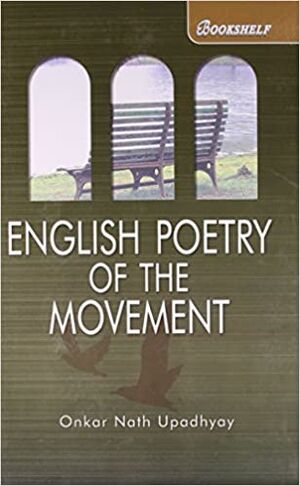
O.N. Upadhyay, English Poetry of The Movement, Bookshelf, 2011. Courtesy Amazon.in.
The Movement was a term coined by J.D. Scott, literary editor of The Spectator, in 1954 to describe a group of English poets.
History[]
Scott's movement included poets such as Kingsley Amis, Philip Larkin, Donald Davie, D.J. Enright, John Wain, Elizabeth Jennings, Thom Gunn, and Robert Conquest. The Movement was essentially English in character; poets in Scotland and Wales were not generally included.
The Movement produced 2 anthologies: Poets of the 1950s (1955) (edited by D.J. Enright, published in Japan) and New Lines (1956). Robert Conquest, who edited the New Lines anthology, described the connection between the poets as 'little more than a negative determination to avoid bad principles.' These 'bad principles' are usually described as excess, both in terms of theme and stylistic devices. The polemic introduction to New Lines targeted in particular the 1940s poets, the generation of Dylan Thomas[1] and George Barker – though not by name.
A 2nd New Lines anthology appeared in 1963, by which time The Movement seemed to some a spent force, in terms of fashion; the 'underground' in the shape of The Group, and the more American-influenced style of the Al Alvarez anthology The New Poetry having come to the fore. Ironically, interest in "The Movement" renewed in the early 90s, primarily in America, with the rise of the New Formalism and increased public interest in the work of Philip Larkin.
The Movement poets were considered anti-Romantic, but we find many Romantic elements in Larkin and Hughes. We may call The Movement the revival of the importance of form. To these poets, good poetry meant simple, sensous content, and traditional, conventional and dignified form. "I like poems to preserve things I have seen/thought/felt." Larkin.
Poets in New Lines (1956)[]
Kingsley Amis, Robert Conquest, Donald Davie, D.J. Enright, Thom Gunn, John Holloway, Elizabeth Jennings, Philip Larkin, John Wain.
Poets in New Lines 2 (1963)[]
Kingsley Amis, Thomas Blackburn, Edwin Brock, Robert Conquest, Hilary Corke, Donald Davie, D.J. Enright, John Fuller, Thom Gunn, Francis Hope, Ted Hughes, Elizabeth Jennings, Richard Kell, Thomas Kinsella, Philip Larkin, Laurence Lerner, Edward Lucie-Smith, George MacBeth, James Michie, Jonathan Price, Vernon Scannell, Anthony Thwaite, John Wain, Hugo Williams.
See also[]
References[]
- Enright, D.J. (editor) Poets of the 1950s: an anthology of new English verse, Tokyo, Kenkyusha, 1955
- Morrison, Blake, The Movement, Oxford University Press, 1980
Notes[]
- ↑ David Lodge wrote: "Dylan Thomas was made to stand for everything they detested: verbal obscurity, metaphysical pretentiousness, and romantic rhapsodising."; from Working with Structuralism (1981), 9.
External links[]
- The Movement in the Oxford Definition of Literary Terms
| This page uses Creative Commons Licensed content from Wikipedia. (view article). (view authors). |